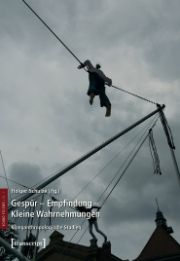Elusive interior surfaces
A book from the "Sound Studies" series asks how we are involved in sounds in our everyday lives and what influence they have on our decisions.

The biography of a composer, a book on the history of Romantic music or a book on new oboe playing techniques arouse concrete expectations. But then there are also books, and these include the anthology edited by Holger Schulze Sense - Sensation - Small perceptionsthat do not immediately reveal their content, that elude established methods and traditional hermeneutic procedures. So for now, the question is: What are the 15 authors of this anthology actually writing about?
Basically, it is about nothing less than other ways and forms of knowledge, about the role of moods or feelings both for everyday existence and for rational thinking. The latter is relativized in unison. However, Hajo Eickhoff also writes: "Decisions based on intuition have the advantage over reason that they are made faster, more reliably and more precisely." (p. 33) Such words sound plausible. If you don't understand them, you'll find plenty of evidence on more than 260 pages. An infant with a congenital heart defect instinctively squats down as soon as the little heart gets out of rhythm in order to reduce the strain on it (Eickhoff, p. 29 f.). Susanne Nemmertz, on the other hand, describes the selection of a suitable bivouac site in the mountains in a very subjective but vivid way. Moods and tonal atmospheres prevail over rational considerations. The experienced mountaineer and lecturer at the Institute of Landscape Architecture at ETH Zurich finally settles down in the place that her own holistically sensitive body suggests (p. 107).
Nemmertz writes somewhat succinctly at the end of her essay that sound plays a special role in the creation of space. It is therefore surprising that in a book with the subtitle "Sound Anthropological Studies" there is so little mention of the effect of the acoustic on the "inner ground" (Ulrich Pothast, p. 81 f.). One explanation may be that terms such as instinct, mood or feeling are difficult to differentiate; understandably, holistically-minded scientists shy away from separating different forms of sensation. Why there is a lack of concrete information about the influence of city noises, the sound of the sea or instrumental sounds is also due to very basic methodological problems. Our language, as the book also addresses, is trained in the "rational principle"; intuition, feeling and instinct, on the other hand, are difficult to grasp conceptually. The right term for such "soft factors" is neither accepted nor found in today's scientific culture. However, a start has been made with such books from the field of cultural studies.
Gespür - Empfindung - Kleine Wahrnehmungen, Klanganthropologische Studien, edited by Holger Schulze, 268 p., paperback, numerous illustrations, with CD-ROM, € 28.80, transcript-Verlag, Bielefeld 2012, ISBN 978-3-8376-1316-2








